War of predators with predators. How Americans fought over the drug trade
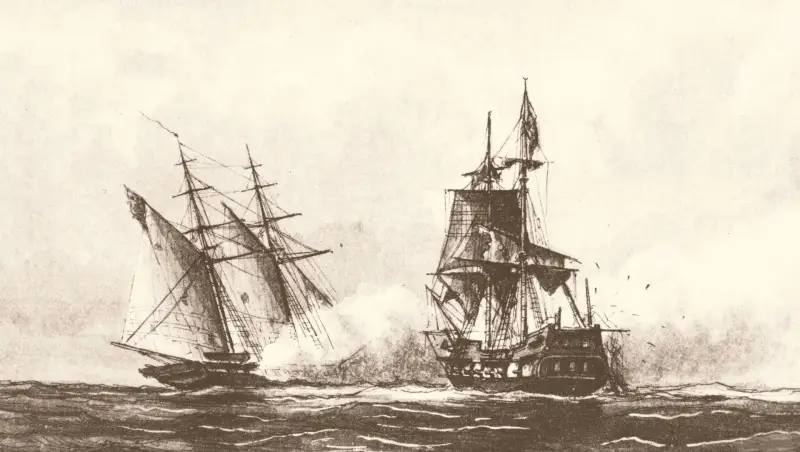
The battle between the Enterprise and Tripoli. From a drawing (circa 1878) by Captain William Bainbridge Hoffa, US Navy, from the collection of the Department of the Navy
ics fought for control of the opium trade.
Varvary Coast
Great Britain and France, which had the strongest navies in Europe, fought for dominance in the Mediterranean at the end of the XNUMXth century. At the same time, they were forced to negotiate with the rulers of Algeria, Tunisia and Tripolitania, who were formally still part of the Ottoman Empire, but were de facto independent. The economies of Algeria, Tunisia, Tripoli and Morocco were based on trade (including the slave trade), and taxes were collected from ships from various countries that visited the region.
An important role in the states of the Barbary Coast (the medieval name for the Mediterranean coast of North Africa from Morocco to Egypt) was played by local pirates, closely associated with local rulers. Interestingly, the British also used their services to crush their competitors.
Through diplomacy, forceful display and inducement, the British and French controlled trade with Turkey. These agreements also concerned American traders who were actively developing the European and world markets. Until 1776, the States were a colony of Great Britain, and after declaring independence, having entered into an alliance with France in 1778, they enjoyed the same advantages as the French.
As a result of England's 20-year war against France, which began in 1793, the rulers of the North African states, who were essentially pirates and slave traders, took over the lucrative Mediterranean trade, particularly the drug trade. The USA, so as not to lose this trade and, not having a military fleetIn order to support their interests, in the period from 1787 to 1797 they concluded agreements with the rulers of Morocco, Algeria, Tripoli and Tunisia, under which they undertook to pay them a duty for the right to quiet trade of American merchants in the Mediterranean. Periodically, all kinds of gifts were delivered to local rulers.
So, in 1784, the US Congress allocated money to pay pirates and authorized its ambassadors in England and France (John Adams and Thomas Jefferson) to conclude peace treaties with the states of the Barbary Coast. The United States paid up to $1 million annually for the next 15 years for the right of free passage in the Mediterranean and for the return of American hostages.
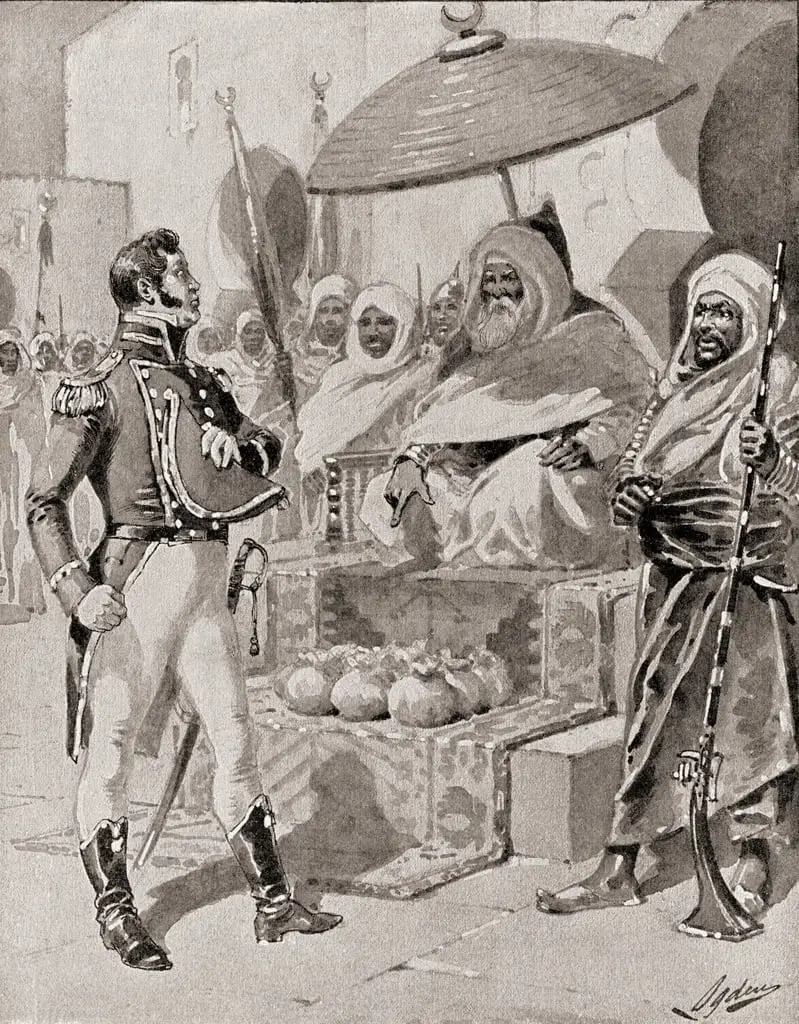
Captain William Bainbridge pays tribute to the dey. Author: Henry Alexander Ogden
US trade expansion
At the end of the XNUMXth century, Americans developed particularly extensive trade in the Mediterranean basin. The foundations for US economic penetration into China were laid here. Unable to export opium from India as a result of the opposition of the British East India Company, American traders purchased it in Turkey and sold it with great profit in China, Indonesia and other Asian countries.
American merchants received excess profits from trade with Turkey. They bought opium there for $3 per pound (0,45 kg) and took it to China. In Canton, opium was already sold at a price of 7–10 dollars. The profit was 150–200%. A lot of opium was also sold in India and Indonesia. At the turn of the XNUMXth–XNUMXth centuries. The United States obtained broad benefits from the Porte, which was noticeably degraded and losing its market to Europeans and Americans. This made it easier for the Americans to take control of the Levant's opium markets.
One of the first American multimillionaires who made their wealth from predatory trade with the countries of Asia and Africa was the Philadelphia businessman S. Girard. He received the nickname “Lonely Midas” in his homeland. His main occupation was the speculative trade in opium. Having accumulated great wealth as a result of the criminal opium trade, Girard became involved in banking. In 1813, he was considered the richest man in the United States. Along with Girard, many other American entrepreneurs participated in the highly profitable opium trade. At the beginning of the XNUMXth century, capitalist “dynasties” – the Astors and Perkinses – rose up in this trade.
In the first half of the XNUMXth century, opium was the most important component of American purchases in the Ottoman Empire, ranking first in value. With the help of opium, the Americans pumped silver out of the Middle Kingdom.
As American trade grew, so did the appetites and claims of North African rulers. Treaties were violated, North African pirates captured and robbed American ships, and ransoms were demanded for captured prisoners. This became the reason for the first US overseas war.
At the same time, the United States was creating a navy. In 1794, Congress passed the Navy Act, which provided for the construction of 6 frigates. In 1797, the first 3 frigates were commissioned, including the Constitution. On April 30, 1798, a separate Ministry of the Navy was created. In 1798–1800 About 30 ships were built to operate against French privateers.
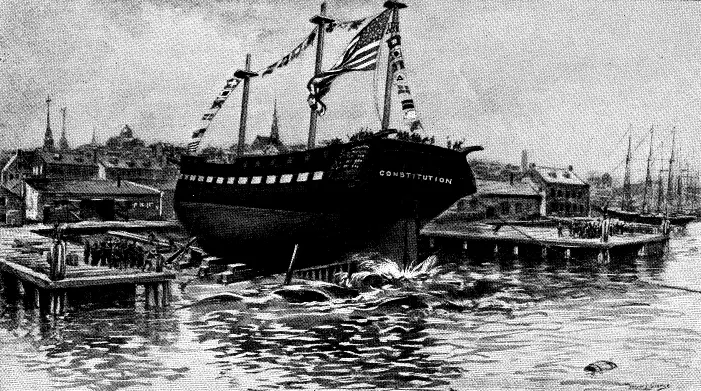
Launching of the frigate USS Constitution ("Constitution"), 1797
Tripolitan War (First Barbary War)
In 1801, Thomas Jefferson came to power in the United States, who, together with his Democratic-Republican party, believed that paying tribute would do little to help trade and would only inspire North African pirates to launch new attacks. and requirements. He proposed focusing efforts on expansion to the west, deep into the mainland, building a fleet in order to refuse to pay tribute.
Immediately after Jefferson's inauguration, Tripoli Pasha Yusuf Karamanli demanded $225 in tribute. Jefferson finally had the opportunity to refuse. Karamanli declared war in the traditional way - he cut down the flagpole with the American flag at the embassy. Morocco, Algeria and Tunisia soon joined their ally.
In response, Jefferson decided to send a squadron to protect US interests in the Mediterranean and notified Congress of this. On May 20, 1801, US Naval Secretary B. Stoddart ordered the so-called observation squadron (ships Philadelphia, Essex, President and Enterprise) to move to the Mediterranean Sea to put pressure on Tripoli. In total, the three squadrons sent to the Mediterranean included 12 frigates, 3 brigs, and several other ships.
Congress did not vote to declare war; it was actually going on anyway. But the president was given full powers to conduct military operations, the captains were allowed to seize any ships and cargo that belonged to the Tripolitan pasha, and to perform other necessary actions justified in war conditions. At the same time, in the United States there were many opponents of the war in Africa - it was too expensive.
At the same time, Sweden also fought against North African pirates, trying to blockade the ports and free its captive citizens. But soon the Swedes ransomed their citizens and stopped hostilities.
At the initial stage there were few clashes. The Barbary pirates avoided the heavily armed American ships. The Americans did not have the strength to carry out serious operations ashore against pirate bases. The only serious engagement was between the frigate Enterprise and the corsair Tripoli in August 1801. The Americans captured the ship. However, the Pasha of Tripoli did not show much fear.
The next year, Washington decided to strengthen the contingent and within a year redirected the best ships of the fleet to the Mediterranean Sea, appointing Edward Preble as commander. In 1803, Preble strengthened the blockade of ports and also authorized the Navy to launch raids against coastal cities.
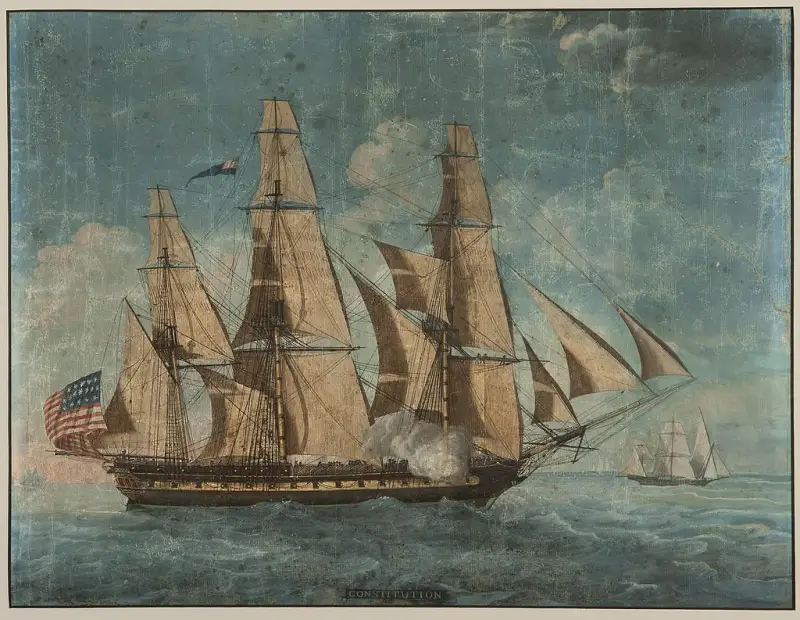
Frigate "Constitution". 1803
Arson of the frigate Philadelphia
In October 1803, Barbary pirates managed to capture unharmed the frigate Philadelphia, which ran aground while patrolling Tripoli harbor. American sailors, under constant fire from coastal batteries and the enemy fleet, tried unsuccessfully to free the ship. The ship, crew and captain William Bainbridge laid down weapon, were brought ashore and taken hostage. The frigate was later anchored in the harbor and turned into an artillery battery.
On the night of February 16, 1804, Lieutenant Stephen Decatur and a small group of sailors carried out a daring operation. The American used a recently captured enemy ship to swim right up to the Philadelphia ship without raising the alarm.
The Americans were dressed like Maltese or Muslim sailors. On board was Salvador Catalano from Sicily, who spoke fluent Arabic. Catalano told harbor staff that their ship had lost its anchor during a recent storm and they now needed shelter to carry out repairs.
Decatur's ship calmly approached the frigate and attacked the enemy. The boarding was sudden: about 20 Tripolians were killed, one was captured, and the rest fled by jumping overboard. None of the Americans were killed, only one was slightly wounded by a saber.
The attempt to hijack the ship was unsuccessful, so the lieutenant burned the Philadelphia. The team was successfully evacuated.
This brave foray was immortalized in the very first lines of the US Marine Corps anthem, and Lieutenant Stephen Decatur became one of the first heroes of America and the Navy after the Revolutionary War. In 1804, at the age of 25, he was promoted to captain, in large part for his courage in setting fire to a ship in the port of Tripoli, becoming the youngest sailor to hold such a rank.
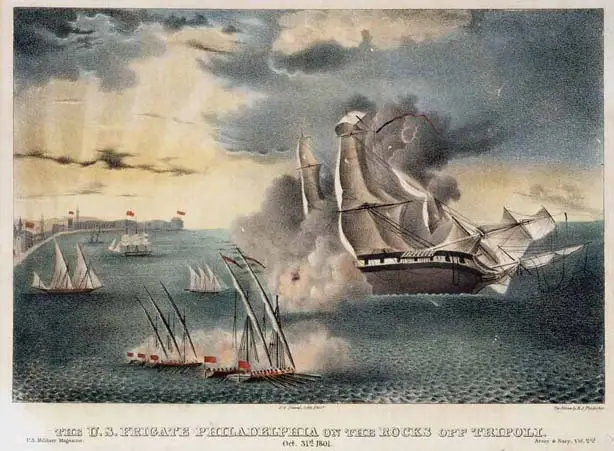
"Philadelphia" aground near Tripoli, 1803
Tripoli attack
After the successful operation to destroy the Philadelphia, Commodore Edward Preble decided to attack the port of Tripoli itself, for which he assembled a squadron of nine ships. The Americans were supported by the Kingdom of Sicily, which also entered the war with Tripoli.
On August 3, 1804, the bombardment of Tripoli began. However, the pirates expected the attack and fought back. They wanted to use the Fearless fireship, loaded with explosives, to burn enemy ships and damage the harbor, but the enemy discovered it in time and destroyed it with naval fire. Captain Richard Somers and the entire crew of the ship were killed. S. Decatur's younger brother James Decatur was also mortally wounded.
Obsessed with revenge, Stephen Decatur boarded an enemy ship whose captain had wounded his brother. In this battle he almost died, but his comrade saved him. Stephen avenged his brother: he killed the Tripolitan captain.
But overall the operation was a failure; Tripoli could not be taken. A repeated attack on Tripoli on August 24 was also unsuccessful.
Then the Americans tried to use the fifth column and organize a coup in Tripoli.
American diplomats - W. Eaton in Tunisia and J. Cathcart in Algeria - developed a plan for carrying out an internal coup in Tripoli and installing a US protege on the throne. For this purpose, it was planned to use the pasha’s brother, Hamet Karamanly, who had previously been defeated in the struggle for power.
With his help, in the spring of 1805, the Americans recruited a detachment of Christian and Muslim mercenaries (about 500 soldiers), which they reinforced with a small unit of American Marines. The detachment made a difficult raid from Alexandria to Derna through the Libyan desert. On April 27, 1805, this small detachment, supported from the sea by one frigate, was able to capture the strategically important city of Derna, thereby opening the way to Tripoli.
The war and naval blockade depleted the treasury of the Tripolitan Pasha Yusuf Karamanli, Pasha Hamet laid claim to the throne, and the enemy captured Derna, threatening Tripoli. Therefore, on June 10, 1805, the Pasha signed a truce. Washington was threatened by war with Britain, so the peace party prevailed over the party of continuing the war. In particular, William Eaton, the former US consul in Tunisia, proposed continuing the attack on Tripoli and bringing Hamet Karamanly to power.
The United States pledged to pay $60 for the release of prisoners of war (300 people). Having imposed its terms on Tripoli, the American fleet headed for Tunisia, whose ruler, dissatisfied with the intrigues of the American diplomatic representative and incited by the British consul, invited the American to leave Tunisia. Under the muzzles of naval guns, peace terms were dictated to the ruler of Tunisia.
The First Barbary War greatly raised the prestige of the US Army and Navy. It showed that America was capable of waging war far abroad and expanding its trade through “gunboat diplomacy.”
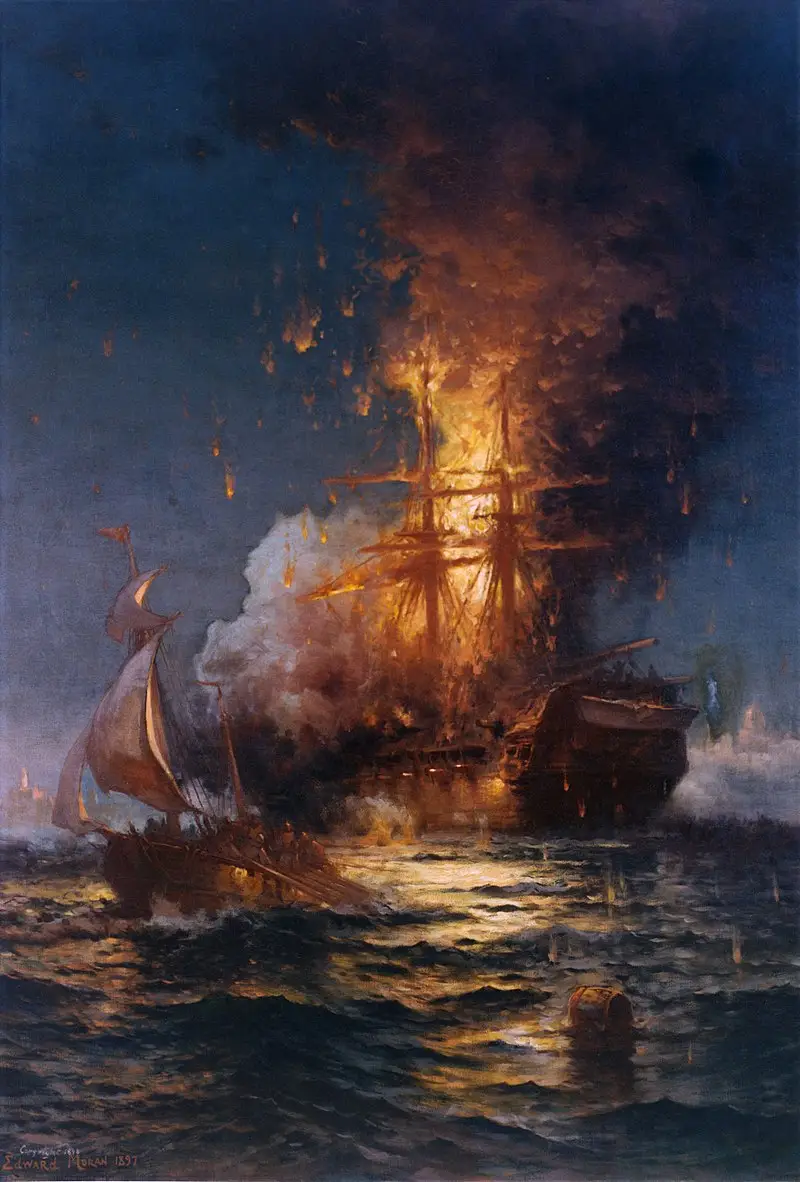
Edward Moran. Burning of the frigate "Philadelphia" on the docks of Tripoli, February 16, 1804
Algerian War (Second Barbary War)
The US failed to solve the underlying problem that was plaguing its opium trade. Already in 1807, African pirates resumed attacks on US merchant ships. Unable to respond to these attacks, the Americans quietly returned to their previous practice of paying tribute.
The rapidly escalating international situation did not allow us to respond to the provocations: in 1812, the war between the United States and Britain began. The Americans wanted to take Canada away from the British, taking advantage of the fact that England was tied up in the war with Napoleon, but they received a blow. So, in 1812, the dey of Algeria, Haji Ali (“dey” - from the Turkish honorary title dayı, literally meaning “uncle”) expelled the American consul from the country and declared war on America due to non-payment of the required annual payments. But Washington had no time for war in Africa.
In February 1815, the war with England ended. On March 3, 1815, the US Congress approved the movement of 10 ships to the coast of Algiers under the command of Stephen Decatur and William Bainbridge, veterans of the First Barbary War. Decatur's squadron departed for the Mediterranean on May 20, 1815. Bainbridge was delayed in training the crews and did not actually have time to take part in the war.
By June 15, 1815, Decatur had reached Gibraltar, where he learned that large Algerian ships had recently passed through there. Decatur immediately gave chase. After 2 days, his squadron, numbering 9 ships, managed to catch up with the flagship of the Algerian fleet - the 64-gun frigate Meshuda. The Algerians desperately resisted, trying to break through to a neutral port, but they could not do anything.
As a result, Decatur managed to capture the ship and about 400 prisoners. A little later, the brig Estidio was captured in a similar manner.
By the end of June, the American squadron reached Algeria. On July 3, the Pasha of Algiers, Omar Agha, capitulated to Decatur's threats and information about the imminent arrival of a second squadron from America. The Americans returned the ships "Meshuda" and "Estidio" and 486 prisoners to Algeria in exchange for captured Americans and Europeans. The Algerian Pasha promised American merchants free passage. The United States was granted "most favored nation" rights. Algeria also pledged to pay $10 in compensation.
Following the strengthening of US positions in Algeria, corresponding “visits” of the American fleet were made to Tunisia and Tripoli, which had to pay large indemnities under the threat of war. After this, the United States decided to create a permanent Mediterranean squadron to protect its trade interests in the region. Her ships usually wintered near the port of Mahon on the island of Menorca (Balearic Islands) and carried out regular patrol duty.
In the spring of 1816, a joint Anglo-Dutch fleet arrived on the shores of Algeria. After unsuccessful negotiations, the Europeans defeated the Barbary fleet in August. Algeria capitulated, freed European captives, promised no more robbery or assistance to pirates, and recognized the independence of the Ionian Islands.
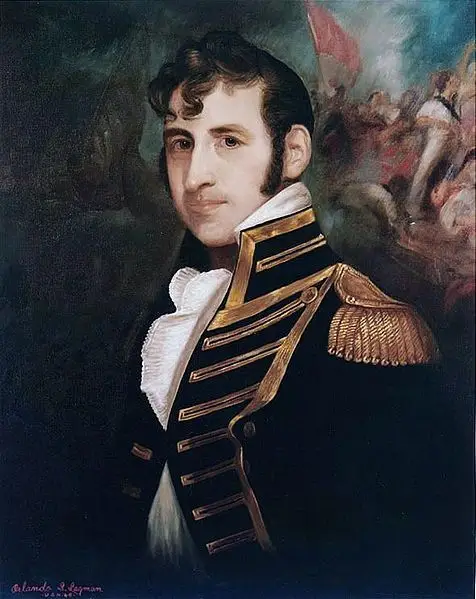
Portrait of Stephen Decatur (artist Orlando Lagman, 1820)
Results
As a result of the Second Barbary War, the states of the Barbary Coast lost their main source of income and quickly ceased to play a serious role in the Mediterranean.
The situation after these events changed dramatically; the states of North Africa themselves became victims of more modern colonial powers from predators. Algeria and Tunisia became colonies of France, Morocco was divided between Spain and France. Tripolitania first returned to Turkish rule, then was recaptured by the Italians.
In American historiography, these clashes are usually loudly called “wars for freedom of navigation in the Mediterranean Sea for all nations.” In fact, it was a war of predators for the extremely profitable drug trade. For the markets of the Mediterranean, Africa and Asia.
Thus, it was a war of American predators against North African parasitic aliens. Young predators from the United States entered the world and captured the extremely profitable trade in the Mediterranean, especially the opium market. The drug and slave trades provided the US with the initial capital for the Industrial Revolution.
Old people leading their history from ancient times, North African slave-owning, pirate clans, which parasitized the trade of the Mediterranean, Levant and Africa, lost, although they retained some positions. North Africa then came under the control of European colonialists.
In the 20-30s of the 1825th century, the Americans tried to develop their success in the Mediterranean. Former Secretary of State J. C. Adams, who became President of the United States in 1825, decided to obtain an appropriate payment from the Sultan for his position favorable to the Porte on the issue of the Greek revolution. In XNUMX, an impressive naval squadron led by Commodore Rogers was sent to the shores of the Porte.
Negotiations lasted until the end of the 20s and were secret. The Americans sought free access for their ships to all Turkish ports and their passage through the Dardanelles, as well as the right to appoint their consuls in any city in Turkey.
As a result, in May 1830, an agreement was signed between the United States and the Ottoman Empire, which legally consolidated the rights and privileges of the “most favored nation” already granted to US entrepreneurs and established a preferential tariff for the import of American goods to Turkey.
Also, in the early 1830s, the Americans sought from the Kingdom of the Two Sicilies (Kingdom of Naples) to transfer ownership of Syracuse to them. They planned to organize a support base there. As a pretext, the argument was put forward that several American ships had been captured during the reign of King Joachim Murat of Naples (1810–1815). In this regard, Washington demanded compensation for losses in the amount of 200 thousand pounds sterling, or Syracuse should be given to them.
The Neapolitan government refused to give up Syracuse. Then the American squadron entered the Bay of Naples and aimed its guns at beautiful Naples. The king paid off the Americans' "debt".
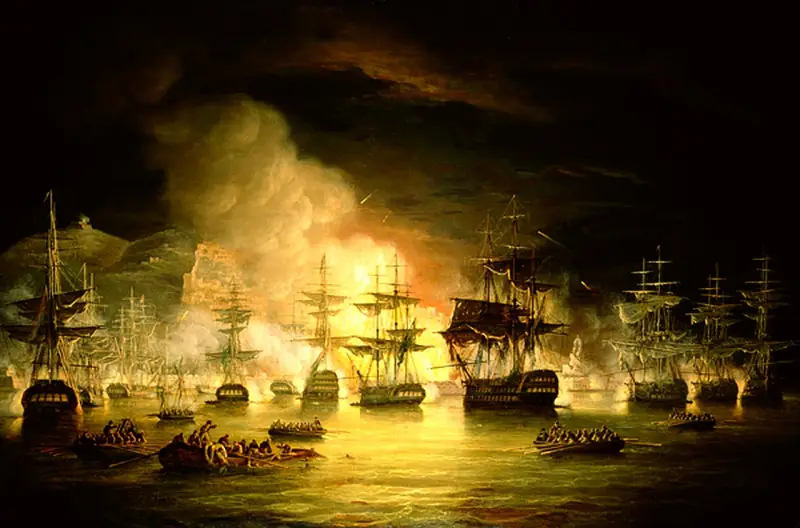
Thomas Looney. Bombardment of Algeria by the Anglo-Dutch fleet, August 27, 1816
Information